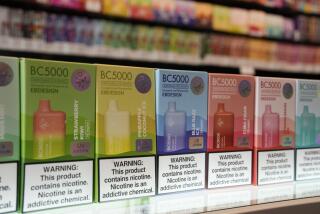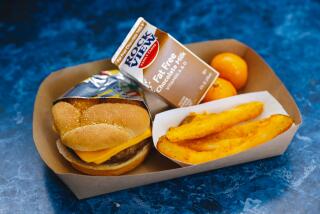Schools’ soda bans don’t stop sugary-drink consumption, study says
- Share via
Teens between age 14 and 18 get more calories from soda than any other single food or drink, research shows, and kids who drink soda and other sugar-sweetened beverages are more likely to be overweight or obese. So health experts who would like to reverse the rise in childhood obesity often focus on reducing kids’ access to these sugary drinks. But a new study has some discouraging news: Students in schools that limited sales of soda and other sugary beverages on campus consumed just as many of the drinks, overall, as students in schools without any such restrictions.
The study, published online Monday by Archives of Pediatrics and Adolescent Medicine, used data on 5,900 of students who have been tracked since they were kindergarteners in 1998. The researchers focused on data collected in the spring of 2004 (when the kids were in fifth grade) and from the spring of 2007 (when they were in eighth grade). To find out whether schools in a particular state regulated the sale of sugar sweetened beverages on campus, they relied on information compiled by the Bridging the Gap research program.
The researchers looked at 40 states; 22 of them had no policy governing sales of sugary drinks in middle schools, 11 forbid sales of soda only, and seven banned all manner of sugar-sweetened beverages, including sports drinks and fruit drinks (but not 100% fruit juices). In all three categories, the prevelance of obesity was essentially the same, ranging from 22.3% to 22.6%. In addition, 83% to 87% of students from all categories drank sugar-sweetened beverages at least once a week, and 26% to 33% of them drank sugar-sweetened beverages at least once a day.
Among the other findings:
- Students in schools that banned soda but not other sugar-sweetened beverages had just as much access to sugary drinks on campus as students in schools without any policy. They were also just as likely to buy sugary drinks at school.
- Students in schools that banned all sugar-sweetened beverages were less likely to encounter or purchase sugary drinks on campus.
- However, students in all three categories were equally likely to purchase a soda, sports drink or fruit drink at some point during the day.
- Surprisingly, students who were subjected to some kind of sugar-sweetened beverage rule at school were actually more likely to consume sugary drinks on a daily basis.
- The one bright spot: Students who didn’t drink soda or other sugar-sweetened beverages on a regular basis were even less likely to do so if their school had any sort of regulation in place.
“Even comprehensive SSB policies were not associated with overall consumption of SSBs, which was largely independent of students’ in-school SSB access,” concluded the study’s four authors, all researchers from the University of Illinois at Chicago who have been studying these issues for years. “The public health impact of these policies may be minimal.”
After all, they wrote, “in the contemporary ‘obesogenic’ environment, youth have countless ways to obtain SSBs through convenience stores, fast-food restaurants, and other food outlets in their community.”
The study was funded in part by the National Heart, Lung, and Blood Institute. You can read a summary of the study online here.
Return to the Booster Shots blog.







